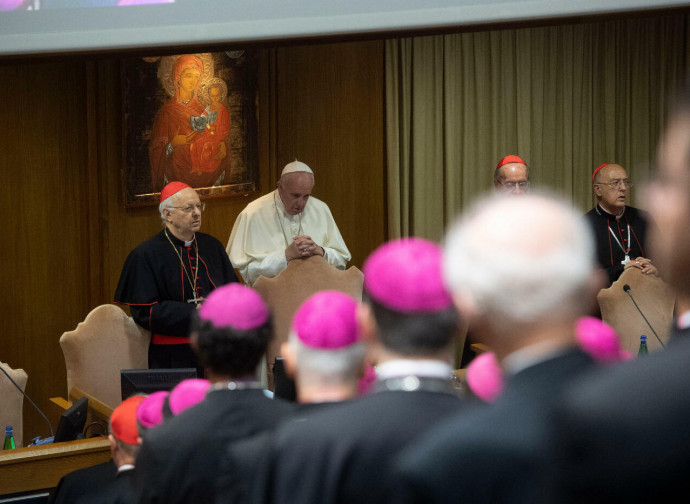If the laity can vote, it is not the Synod 'of Bishops'
The goalposts have been moved with the synodal process underway: pink quotas and lay quotas effectively distort the institution established by St Paul VI and regulated by canon law. And even if it is clear where this is heading, let us breathe a sigh of relief: an assembly redefined in this way does not 'make' magisterium.

It was predictable. In yet another interview with Francis, the one on 10 March with Elisabetta Piqué (on her knees, or rather prostrate), the Pope had announced 'universal suffrage' in the synodal assemblies of the Catholic Church: “everyone who participates in the synod has the right to vote. Whether man or woman. Everyone, everyone. This word 'everyone' is decisive for me”.
A little over a month later, the Secretariat of the Synod, through some changes (the document in the various languages with the changes can be downloaded here), announced the transformation of the category of auditors, to real members with voting rights. According to the Pontiff's wishes, "everyone" will therefore be able to vote. But since, as in every banana republic, the license of “everyone” is given only by the boss, even the Pope has seen fit not to violate the custom: the 70 new non-bishops voting members are decided by him. So, synodality, but without exaggeration. Historian Lucetta Scaraffia also realised this: “I find this fact of the synodal pope increasingly centralising incredible”. It is not incredible. It is typical of a certain South American current.
Always in scrupulous compliance with the parallel bureaucracy, necessary to every dictatorial government, the thumbs down or up will be exercised by the Pope on a list of 140 people, the Secretariat explains, "identified (and not elected) by the seven International Meetings of Bishops' Conferences and the Assembly of Patriarchs of the Eastern Catholic Churches (20 for each of these ecclesial realities)". Half of those elected must necessarily be in the pink quota. A masquerade, a duty paid to political correctness.
The magnificent 70 come from a kind of pre-selection, on the basis of the candidates' "general culture" (multiple choice or free answer test?), "their prudence" (i.e. the degree of submission), but also "their knowledge, theoretical and practical" (of what? Topic of choice?), and finally "their participation in various capacities in the synodal process", a fundamental condition to understand whether the candidate has already shown absolute loyalty to the system. Orthodoxy, integrity of moral life, particular merits in service to one's neighbour: outdated criteria. And, no less important, at the Synod there will be not a representation of the real Church, but of the 'individuated' one, that is, the one that has been selected according to the entirely vague and subjective criteria mentioned above.
Let us return to the women's quota: 35 chosen, to which are added, by virtue of another change desired by the pope, 5 women religious elected by the organisations of Major Superiors (who will be joined by an equal number of male counterparts) and the chosen one par excellence, the undersecretary Sister Nathalie Becquart, the first woman to have the right to vote in a Synod of Bishops by the will of the pope.
At the time, February 2021, Cardinal Mario Grech, Secretary General of the General Secretariat of the Synod, had commented: “With the appointment of Sister Becquart and her ability to participate with voting rights a door has been opened, we will then see what other steps can be taken in the future”. The mysterious future steps, at least the closest ones, were already rather obvious: if one lay person can vote at a Synod of Bishops, it is not clear why 70 cannot vote, and maybe tomorrow even half the members. Whether male or female.
With the vote of the laity within the Synod, we can safely assume that it is no longer the Synod of Bishops, as defined and regulated by canons 342-348. Canon 342 is almost tautological: “The synod of bishops is an assembly of bishops who [...] meet at specified times to foster close union between the Roman Pontiff and the bishops themselves”. And, lo and behold, even the Apostolic Constitution Episcopalis Communio, signed by Francis, taught that the members of the Synod of Bishops are the Bishops, according to can. 346, to which are added members of clerical religious institutes. There are also 'other participants', including lay people, who, however, do not have the right to vote.
Despite the assurances "to maintain the episcopal specificity of the Assembly convened in Rome", it is not within the Pope's power to order that a reality be different from what it is, or to suppress the principle of non-contradiction. The Synod of Bishops is such because it has bishops as members; if a quota, which appears to be about 1/4, is not made up of bishops, nor is it linked to the hierarchical constitution of the Church through the sacred order, then it is no longer the Synod of Bishops, but rather of Christians. Which is not better or worse, but simply something else.
So, Pope Francis' decision basically allows us breathe a sigh of relief. Where the Synod will go from here, in terms of content and discipline, is quite clear, and it is not a good prospect. But now at least we know that the document that will come out of the Assembly will simply not be a document of the Synod of Bishops, and therefore any ratification by the Supreme Pontiff (cf. can. 343) will simply be null and void.
Second consideration: female priesthood is closer than we think. And the negative position expressed by Francis is not at all reassuring. First of all, because the Pope has shown that he can quietly say and write one thing and do (or let do) the exact opposite. The issue of the blessing of same-sex couples is quite obvious. As is the Apostolic Constitution mentioned above. Moreover, it is a fact that more than one premise has been set in the direction of conferring Holy Orders on women: the reopening of the issue of the female diaconate, with the establishment, in April 2020, of a new study Commission on the subject; then the Motu Proprio Spiritus Domini (2021), which admitted women to the ministries of the Reader (see here) and Acolyte; then the appointment of three women to the Dicastery of Bishops (see here). And now women (and the laity in general) equated with bishops, as members of a Synod of Bishops. Many, too many Overton windows have been opened.
Finally, as Fr Gerard Murray has written, the possibility of lay people voting during the Assembly of the Synod of Bishops has radically distorted its nature, since the Synod is no longer the communion of the Church's pastors with the Pope to discuss and find solutions to the needs of the universal Church, part of their divine mission to "sanctify, teach, and govern the flock of Christ". What is to be constituted is something totally different: “persons who are not sacramentally conformed by Holy Orders to Christ, the High Priest, will be treated in law as equal to bishops”. The Synod's General Rapporteur, Cardinal Jean-Claude Hollerich, was quick to downplay it by declaring that this would be “an important change, but not a revolution”. Which in Orwellian doublespeak means: it is a revolution, but you mustn’t see it that way.
Instead, the truth is clearly expressed by Fr Murray: “This innovation must be rejected by the bishops of the Church. It conflicts with the Church's dogmatic teaching on the nature of the Sacrament of Orders, in particular the nature of the episcopate”.



